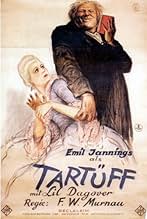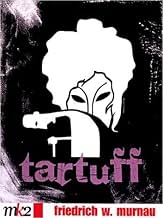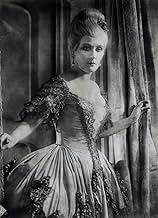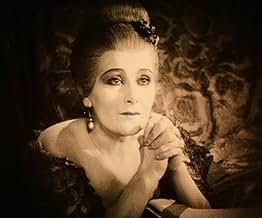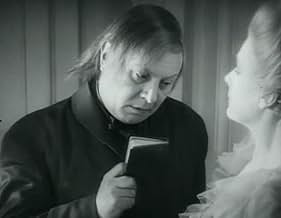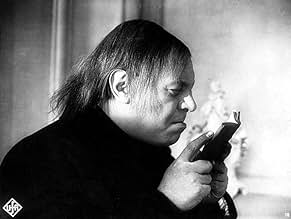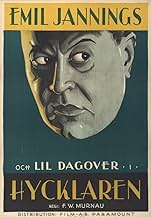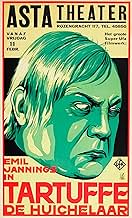IMDb-BEWERTUNG
7,1/10
2866
IHRE BEWERTUNG
Ein junger Mann zeigt seinem millionenschweren Großvater einen Film, der auf Molières Tartuffe basiert, um die heuchlerische Haushälterin des alten Mannes zu entlarven, die es auf sein Erbe ... Alles lesenEin junger Mann zeigt seinem millionenschweren Großvater einen Film, der auf Molières Tartuffe basiert, um die heuchlerische Haushälterin des alten Mannes zu entlarven, die es auf sein Erbe abgesehen hat.Ein junger Mann zeigt seinem millionenschweren Großvater einen Film, der auf Molières Tartuffe basiert, um die heuchlerische Haushälterin des alten Mannes zu entlarven, die es auf sein Erbe abgesehen hat.
Empfohlene Bewertungen
As I've discovered after relatively recent viewings of 'Nosferatu (1922),' 'The Last Laugh (1924)' and 'Faust (1926),' F.W. Murnau was one of the most exciting and influential European directors working during the 1920s. His contributions towards early German cinema are rivalled only by Fritz Lang, and his ability to use lighting and shadows to create atmosphere are almost unparalleled. 'Herr Tartüff / Tartuffe (1926)' was apparently forced upon Murnau by contractual obligations with Universum Film (UFA), and you suspect that perhaps his heart wasn't quite in it, but the end result nonetheless remains essential viewing, as are all the director's films. The story is based upon Molière's successful 1664 play, "Tartuffe," which explored the notion of hypocrisy, particularly among self-proclaimed religious "devotees." Murnau and screenwriter Carl Mayer stripped the story to its bare essentials, removing any extraneous supporting characters and creating a close-knit triangle Herr Orgon, Frau Elmire and Tartüff around which the story revolves. Murnau also added an interesting framing device, whereby the story of Tartuffe becomes a film-within-a-film that a young actor shows to his grandfather to warn of his housekeeper's evil intentions.
Interestingly, I found the story's prologue of the old man and his scheming housekeeper to be a more engrossing story than the film that the characters are later shown. The conniving old woman (Rosa Valetti), with a devilish grin like a Cheshire Cat, manages to convince her senile employer (Hermann Picha) that his grandson has dishonoured the family name by becoming an actor, and so she sets herself up to inherit his entire fortune. When the sincere young actor (André Mattoni) finds out about this betrayal, he plans an ingenious stratagem to outwit the malicious housekeeper and convince his grandfather of her evil. Murnau was obviously a great believer in the power of cinema, and so it's no surprise that the young man chooses the cinematic medium with which to reveal the ultimate truth about hypocrites. The film, by employing a few deceptively simple shots, immediately translates the inner motivations driving each character: the housekeeper, greedy and malevolent, kicks aside her master's slippers, whereas the kind, loving grandson delicately sets them back into place. Also notable is a moment during the narrative when the young actor turns to the camera and addresses the audience directly, one of the earliest instances I've seen of a character "breaking the fourth wall."
The tale of Tartuffe himself is also worth watching for its technical accomplishments, even if the story itself seems somewhat generic and uninteresting. Most astounding is Murnau's exceptional use of lighting {assisted, of course, by cinematographer Karl Freund}, and, in many cases, entire rooms are seemingly being illuminated only by candlelight. This story concerns a happily-married woman, Frau Elmire (Lil Dagover), who is distraught to discover that her beloved husband, Herr Orgon (Werner Krauss), has become obsessed with Tartüff (the great Emil Jannings), a grotesque little man who speaks with divine importance and claims to be a Saint. However hard she tries, Elmire cannot convince Orgon that he has been duped by a religious fraud, so great is the cunning of Tartüffe's deception. In the film, Jannings predictably gives the finest performance, playing the unsavoury title character with a mixture of sly arrogance and lustful repugnance. Nevertheless, the role falls far short of the silent actor's greatest performances, which include Mephisto of 'Faust (1926)' and the hotel porter from 'The Last Laugh (1924).'
Interestingly, I found the story's prologue of the old man and his scheming housekeeper to be a more engrossing story than the film that the characters are later shown. The conniving old woman (Rosa Valetti), with a devilish grin like a Cheshire Cat, manages to convince her senile employer (Hermann Picha) that his grandson has dishonoured the family name by becoming an actor, and so she sets herself up to inherit his entire fortune. When the sincere young actor (André Mattoni) finds out about this betrayal, he plans an ingenious stratagem to outwit the malicious housekeeper and convince his grandfather of her evil. Murnau was obviously a great believer in the power of cinema, and so it's no surprise that the young man chooses the cinematic medium with which to reveal the ultimate truth about hypocrites. The film, by employing a few deceptively simple shots, immediately translates the inner motivations driving each character: the housekeeper, greedy and malevolent, kicks aside her master's slippers, whereas the kind, loving grandson delicately sets them back into place. Also notable is a moment during the narrative when the young actor turns to the camera and addresses the audience directly, one of the earliest instances I've seen of a character "breaking the fourth wall."
The tale of Tartuffe himself is also worth watching for its technical accomplishments, even if the story itself seems somewhat generic and uninteresting. Most astounding is Murnau's exceptional use of lighting {assisted, of course, by cinematographer Karl Freund}, and, in many cases, entire rooms are seemingly being illuminated only by candlelight. This story concerns a happily-married woman, Frau Elmire (Lil Dagover), who is distraught to discover that her beloved husband, Herr Orgon (Werner Krauss), has become obsessed with Tartüff (the great Emil Jannings), a grotesque little man who speaks with divine importance and claims to be a Saint. However hard she tries, Elmire cannot convince Orgon that he has been duped by a religious fraud, so great is the cunning of Tartüffe's deception. In the film, Jannings predictably gives the finest performance, playing the unsavoury title character with a mixture of sly arrogance and lustful repugnance. Nevertheless, the role falls far short of the silent actor's greatest performances, which include Mephisto of 'Faust (1926)' and the hotel porter from 'The Last Laugh (1924).'
This is the fourth Murnau i've seen, after Nosferatu, Sunrise and Faust. I admire the work of Murnau for it's beautiful compositions an camera movement. Murnau is able to translate the mood he want's to set into composition and movement without being artsy for the sake of it.
Tartuffe has quiet a story behind it. Apparently, Murnau was forced by contract to make this film. So this film is to Murnau what Spartacus was to Kubrick. Even though it's still a Murnau picture: again Murnau knows how to give a quiet flat story more depth by suggestion and style. I liked the film, it's hasn't got the outdoors scene's that Sunrise and Nosferatu had, or the huge sets and special effect of Faust, but still it remains an exciting film. Don't hold back by the negative reviewers of the film, this is, by all means, not a bad film. It's just that Murnau made so much breathtaking stuff in his other work, that this film seems not so historical interesting. But if you're a fan of Murnau's other work I'm sure you'll like this as well. Make sure you'll watch the Masters of Cinema edition. It has a great documentary about the making of this film. It gave me a lot of new insights about the film and about Murnau.
Tartuffe has quiet a story behind it. Apparently, Murnau was forced by contract to make this film. So this film is to Murnau what Spartacus was to Kubrick. Even though it's still a Murnau picture: again Murnau knows how to give a quiet flat story more depth by suggestion and style. I liked the film, it's hasn't got the outdoors scene's that Sunrise and Nosferatu had, or the huge sets and special effect of Faust, but still it remains an exciting film. Don't hold back by the negative reviewers of the film, this is, by all means, not a bad film. It's just that Murnau made so much breathtaking stuff in his other work, that this film seems not so historical interesting. But if you're a fan of Murnau's other work I'm sure you'll like this as well. Make sure you'll watch the Masters of Cinema edition. It has a great documentary about the making of this film. It gave me a lot of new insights about the film and about Murnau.
In 1992, an Italian TV channel showed a two-week late-night retrospective of Silent films, the bulk of which were expressionist classics. Unfortunately, I missed out on a couple of these and TARTUFFE was among them. More than a decade had to pass before I could watch it, by which time I had come to consider Murnau - despite the fact that only a small portion of his work has survived the ravages of time - as one of the undisputed masters of cinema.
For some reason, TARTUFFE has been little-seen over the years so that it never had much of a reputation (which may explain why I by-passed its sole TV showing to begin with!); having watched the film now, it clearly emerges as a masterwork from the golden age of German cinema and its place in Murnau's irreproachable canon (still impressive 75 years after the director's untimely death!) should not be overlooked.
Having watched OTHELLO (1922) - which also starred Emil Jannings and Werner Krauss - relatively recently, I couldn't help noticing that it offers an interesting role-reversal with Murnau's film for these two powerhouse actors; in fact, Jannings' larger-than-life performance here is played alongside an impressively restrained turn from Krauss (whom I had previously only seen essaying villainous characters). One of TARTUFFE's most interesting elements is its 'film-within-a-film' structure that looks back to THE CABINET OF DR. CALIGARI (1919; featuring Krauss's most famous role, interestingly enough) and forward to Hiroshi Teshigahara's THE FACE OF ANOTHER (1966) - which, coincidentally, I watched the very next day (my review of which is shortly to follow) without having prior knowledge of this! Criticized at the time for being a pointless flourish on the film-makers' part, I strongly feel that - with respect to TARTUFFE, at least - this device merely underlines the universality of the main theme being dealt with. I see, however, a third connection at play here, this time with Murnau's own NOSFERATU (1922): Tartuffe is presented as a different form of bloodsucker, one who is not undead but very much alive (or human, if you like), and just as dangerous - not to mention that much more common in our daily life than the vampire of myth and literature; besides, the fact that - as in NOSFERATU - here it is the devoted wife of the man under the influence of Moliere's symbolic figure of hypocrisy ("From now on, all hypocrites shall be called 'Tartuffe'!" reads a subtitle) who brings about his come-uppance, by 'sacrificing' herself, only helps reinforce this particular aspect.
Despite the film's relative brevity (explained in my notes for the accompanying documentary below), its intimate nature, and also the fact that Murnau was handed the project at short notice, his trademark stylistics of expressionistic lighting and acrobatic camera-work are well in evidence. Finally, I would like to say something about the English subtitles - displayed over the original German intertitles - for all three of "Masters Of Cinema"'s Silent releases (the others being, of course, SPIONE [1928] and ASPHALT [1929]): I admire Eureka/MoC's decision to preserve authenticity in every aspect of their DVDs, but the interweaving text (with the English translation appearing in too small a font) makes it a comparatively labored read overall! At this juncture, I truly regret missing out on the retrospective of Murnau's work shown a few years back at London's National Film Theatre - and I can only long for the time I will be able to watch the likes of JOURNEY INTO THE NIGHT (1921), THE HAUNTED CASTLE (1921; when I was in Hollywood I held in my hands a DVD-R of this film but, since it had been announced for DVD release by Image, I didn't rent it), THE BURNING SOIL (1922), PHANTOM (1922; the same comments for THE HAUNTED CASTLE apply here, its DVD release from Flicker Alley has been imminent for some time now!), THE GRAND DUKE'S FINANCES (1924) and CITY GIRL (1930). It's inconceivable how the work of such an important film-maker, so long as it is available, is kept mysteriously under wraps - thus denying film buffs everywhere the opportunity of enjoying it!
The 41-minute documentary, TARTUFFE: THE LOST FILM (2004; TV), is an essential watch for fans of Silent films and director F. W. Murnau: although TARTUFFE may not be among Murnau's greatest films, it is certainly one of his most personal as he identified himself with the young relative who is shunned from his inheritance because he has chosen the lowbrow way of the artist rather than a more lucrative profession. Besides, the documentary highlights the depressing state of most Silent films in existence today: while we should consider ourselves lucky that the U.S. theatrical version of TARTUFFE (from which the DVD transfer was made) is in such a good state, it is considerably shorter than the original German version. Fragments of the lost scenes shown in the documentary include a couple of key sequences which, as incomplete as they are in the film now, seem a little rushed. Although the quality is understandably inferior, one wonders why they weren't included in the main feature itself.
For some reason, TARTUFFE has been little-seen over the years so that it never had much of a reputation (which may explain why I by-passed its sole TV showing to begin with!); having watched the film now, it clearly emerges as a masterwork from the golden age of German cinema and its place in Murnau's irreproachable canon (still impressive 75 years after the director's untimely death!) should not be overlooked.
Having watched OTHELLO (1922) - which also starred Emil Jannings and Werner Krauss - relatively recently, I couldn't help noticing that it offers an interesting role-reversal with Murnau's film for these two powerhouse actors; in fact, Jannings' larger-than-life performance here is played alongside an impressively restrained turn from Krauss (whom I had previously only seen essaying villainous characters). One of TARTUFFE's most interesting elements is its 'film-within-a-film' structure that looks back to THE CABINET OF DR. CALIGARI (1919; featuring Krauss's most famous role, interestingly enough) and forward to Hiroshi Teshigahara's THE FACE OF ANOTHER (1966) - which, coincidentally, I watched the very next day (my review of which is shortly to follow) without having prior knowledge of this! Criticized at the time for being a pointless flourish on the film-makers' part, I strongly feel that - with respect to TARTUFFE, at least - this device merely underlines the universality of the main theme being dealt with. I see, however, a third connection at play here, this time with Murnau's own NOSFERATU (1922): Tartuffe is presented as a different form of bloodsucker, one who is not undead but very much alive (or human, if you like), and just as dangerous - not to mention that much more common in our daily life than the vampire of myth and literature; besides, the fact that - as in NOSFERATU - here it is the devoted wife of the man under the influence of Moliere's symbolic figure of hypocrisy ("From now on, all hypocrites shall be called 'Tartuffe'!" reads a subtitle) who brings about his come-uppance, by 'sacrificing' herself, only helps reinforce this particular aspect.
Despite the film's relative brevity (explained in my notes for the accompanying documentary below), its intimate nature, and also the fact that Murnau was handed the project at short notice, his trademark stylistics of expressionistic lighting and acrobatic camera-work are well in evidence. Finally, I would like to say something about the English subtitles - displayed over the original German intertitles - for all three of "Masters Of Cinema"'s Silent releases (the others being, of course, SPIONE [1928] and ASPHALT [1929]): I admire Eureka/MoC's decision to preserve authenticity in every aspect of their DVDs, but the interweaving text (with the English translation appearing in too small a font) makes it a comparatively labored read overall! At this juncture, I truly regret missing out on the retrospective of Murnau's work shown a few years back at London's National Film Theatre - and I can only long for the time I will be able to watch the likes of JOURNEY INTO THE NIGHT (1921), THE HAUNTED CASTLE (1921; when I was in Hollywood I held in my hands a DVD-R of this film but, since it had been announced for DVD release by Image, I didn't rent it), THE BURNING SOIL (1922), PHANTOM (1922; the same comments for THE HAUNTED CASTLE apply here, its DVD release from Flicker Alley has been imminent for some time now!), THE GRAND DUKE'S FINANCES (1924) and CITY GIRL (1930). It's inconceivable how the work of such an important film-maker, so long as it is available, is kept mysteriously under wraps - thus denying film buffs everywhere the opportunity of enjoying it!
The 41-minute documentary, TARTUFFE: THE LOST FILM (2004; TV), is an essential watch for fans of Silent films and director F. W. Murnau: although TARTUFFE may not be among Murnau's greatest films, it is certainly one of his most personal as he identified himself with the young relative who is shunned from his inheritance because he has chosen the lowbrow way of the artist rather than a more lucrative profession. Besides, the documentary highlights the depressing state of most Silent films in existence today: while we should consider ourselves lucky that the U.S. theatrical version of TARTUFFE (from which the DVD transfer was made) is in such a good state, it is considerably shorter than the original German version. Fragments of the lost scenes shown in the documentary include a couple of key sequences which, as incomplete as they are in the film now, seem a little rushed. Although the quality is understandably inferior, one wonders why they weren't included in the main feature itself.
Based on Moliere's classic seventeenth century comedy, this version of TARTUFFE has the eponymous antihero (Emil Jannings) being ultimately outwitted by the family; at the same time the head of the family Orgon (Werner Krauss) remains as blissfully unaware of how to distinguish truth from falsity as he did at the beginning. F. W. Murnau's version is set in a large, rambling house, full of wide staircases and plenty of doors. He proves himself a master of the camera; his close-ups focusing on the pockets as Tartuffe stashes away his ill-gotten gains while pretending to embrace religion, or on Elmire's (Lil Dagover's) breasts, as Tartuffe tries and fails to keep his hands from touching them. Jannings is given full rein to show off his range of facial expressions as Tartuffe; here is a genuinely evil man who believes he can do anything under the cloak of religion. What makes this TARTUFFE most interesting, at least for students of history, is the specially-added prologue and epilogue, in which a young man (André Mattoni) shows his wealthy grandfather (Hermann Picha) the film of TARTUFFE, in order to alert him to the old man's hypocritical governess (Rosa Valetti), and her designs on his fortune. The young man is impoverished, but shown to be much more able to understand human behavior than his grandfather. Through this device Murnau takes a pot-shot at how capitalism and wealth often destroys judgment, creating a covetous society in which everyone is out for themselves. This could be a microcosm of Germany in the mid- Twenties, before the Nazi accession to power. This TARTUFFE moves along at a brisk pace, complemented by a jaunty soundtrack. Worth watching.
When first performed at Versailles in 1664 his play 'Tartuffe' landed Moliere in all sorts of trouble due to its depiction of impiety and religious hypocrisy. Apparently the Archbishop of Paris threatened anyone with excommunication who performed, watched or even read it! It was finally staged with great success in 1669 in the five act version we know today. Obviously humbled by the experience Moliere's satire was never again quite as scathing. The film under review is extremely scathing however and presents Tartuffe in the person of Emil Jannings as a monster of avarice and lechery.Well, nobody's perfect! His true nature is finally revealed and Orgon, played by Werner Krauss is reunited with his wife Elmire, portrayed by Lil Dagover, who had been estranged due to Tartuffe's evil influence. Only these three characters plus Lucie Hoflich as Dorine the housekeeper remain from Moliere's original so this piece cannot be judged as a film of the play. Purely as a film it is exceptionally well made and acted. This is hardly surprising as some of the greatest talents of Weimar cinema are involved. The 'film-within-a-film' concept of the brilliant but ill-fated Carl Mayer is inspired. Director Murnau has once again the services of the superlative Karl Freund behind the camera whilst Walther Rohrig and Robert Herlth contribute their magnificent art direction. It is beyond the power of words of course to define the breadth of Murnau's talent. Werner Krauss is a terrifyingly good actor and makes the most of a pretty thankless part. Although Jannings was dismissed by Dietrich as 'an old ham' it was always, well, nearly always, ham of the finest quality. This is also the first film of the lovely Camilla Horn who is uncredited as Lil Dagover's stunt double! She went on the following year to make her mark as Gretchen in 'Faust' for the same director. 'Tartuffe' is highly recommended for those few who appreciate film as an art form.
Wusstest du schon
- WissenswertesCamilla Horn served as Lil Dagover's foot double in this film. This small role effectively launched her lengthy acting career, as she was noticed by director F.W. Murnau and cast as the lead actress in his film, Faust (1926).
- Alternative VersionenThis film was published in Italy in an DVD anthology entitled "Il castello di Vogelod", distributed by DNA Srl. The film has been re-edited with the contribution of the film history scholar Riccardo Cusin . This version is also available in streaming on some platforms.
- VerbindungenFeatured in Dämonische Leinwand - Der deutsche Film der zwanziger Jahre (1998)
Top-Auswahl
Melde dich zum Bewerten an und greife auf die Watchlist für personalisierte Empfehlungen zu.
Details
- Laufzeit
- 1 Std. 14 Min.(74 min)
- Farbe
- Sound-Mix
- Seitenverhältnis
- 1.33 : 1
Zu dieser Seite beitragen
Bearbeitung vorschlagen oder fehlenden Inhalt hinzufügen

